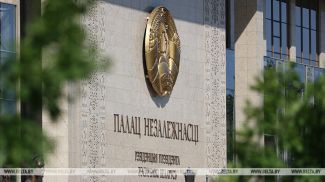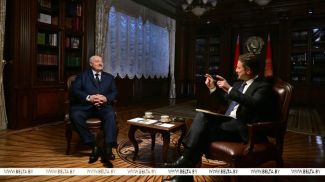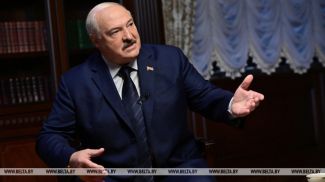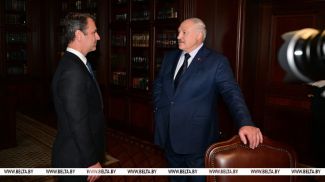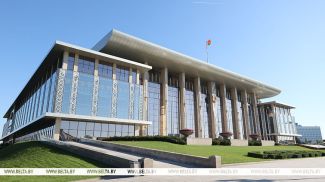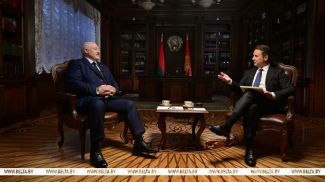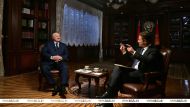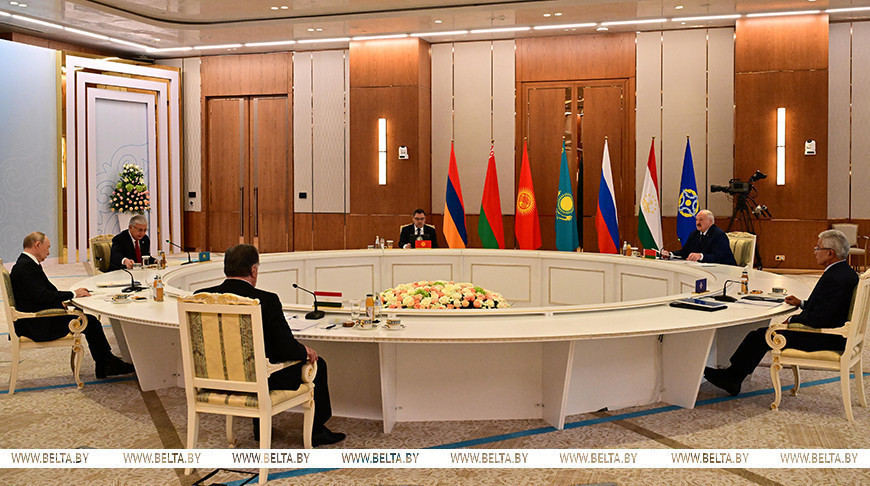
On 28 November, Belarusian President Aleksandr Lukashenko took part in the summit of the Collective Security Treaty Organization (CSTO) in Astana, the capital of Kazakhstan. The event itself was relatively short. Aleksandr Lukashenko worked in the Astana Palace of Independence for four and a quarter hours. But during this time a number of important statements and initiatives were made and 14 documents were signed.
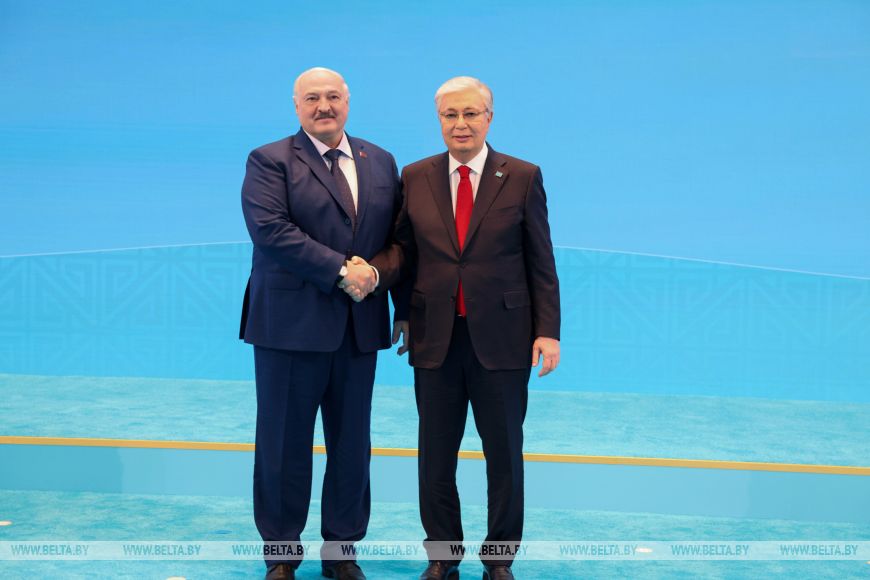
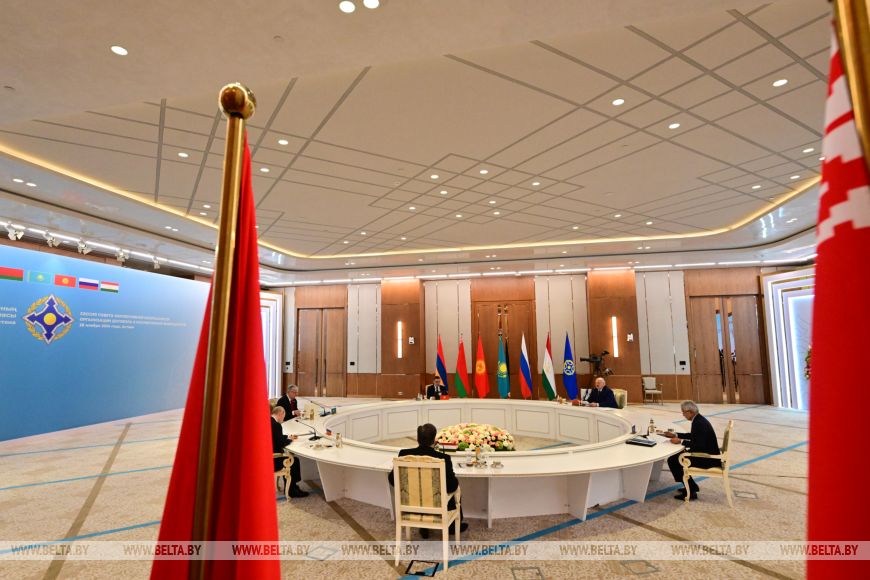
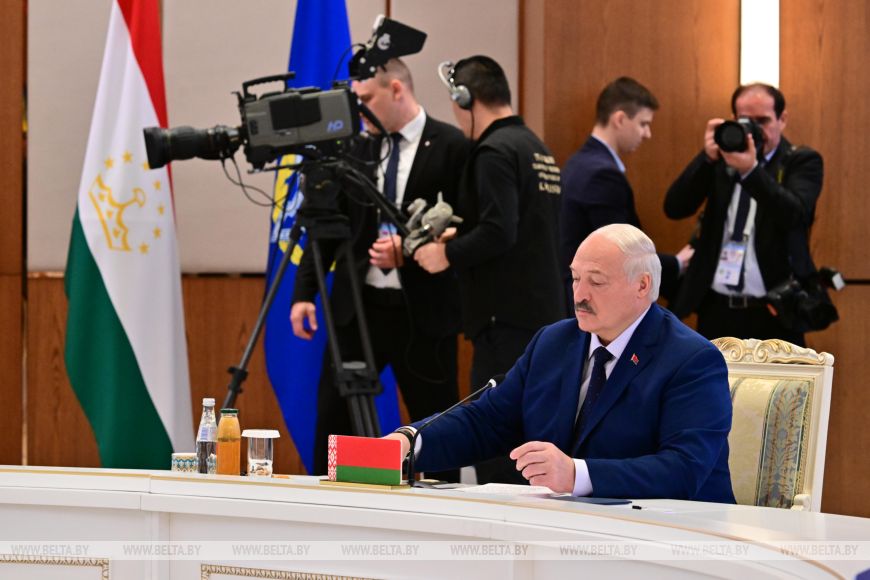
Less than a month ago Belarus hosted the 2nd Minsk International Conference on Eurasian Security. This forum is designed to demonstrate the desire of the Eurasian states to change life for the better. “Multipolarity is a historical inevitability,” Aleksandr Lukashenko stressed.
According to the president, the idea of the Charter of Diversity and Multipolarity in the 21st century proposed by Belarus is aimed at forming a just world order based on the principles of equality, sovereignty, indivisibility, security and respect for the diversity of development paths.
On the CSTO's place in the new security architecture of Eurasia
“The key to solving problems and creating effective security mechanisms lies within our Eurasia with its thousand-year history of coexistence of different peoples, interpenetration of cultures and civilizations. In the new paradigm of international relations, the CSTO should become one of the military and political pillars of the emerging security architecture of the Eurasian continent, setting a trend for the entire regional security agenda,” the Belarusian leader said.
Aleksandr Lukashenko noted that the CSTO has amassed certain experience and needs to share it with other international organizations in the Eurasian space.
On Belarus' initiatives on new weapons control
Aleksandr Lukashenko pointed out a number of new tasks that the allies will have to address when forming a new architecture of Eurasian security and strengthening the CSTO.
First, the president considers it important to strengthen the interaction between international organizations working in Eurasia. “In this regard, I propose to think about organizing a meeting of senior officials of the regional organizations of ASEAN, the CSTO, the SCO, the CIS, the CICA, and the Gulf Cooperation Council," he said.
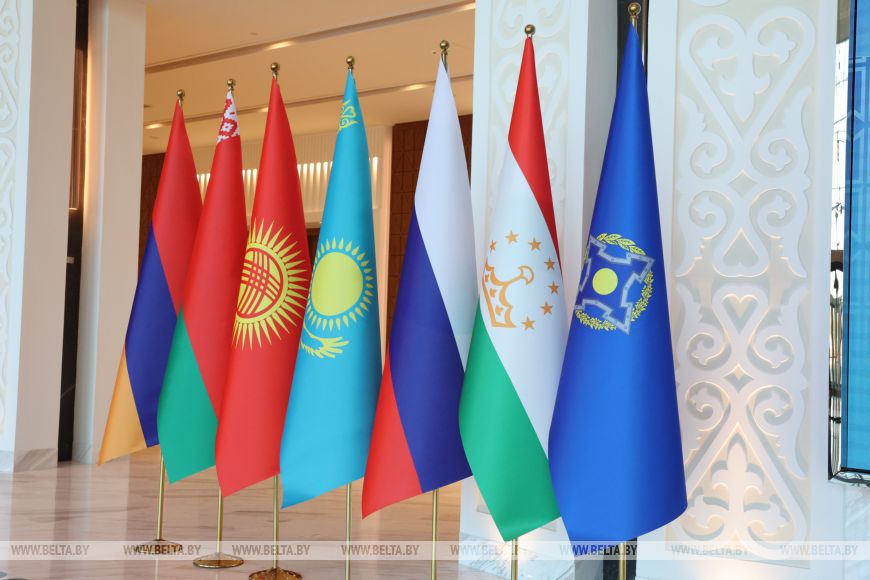
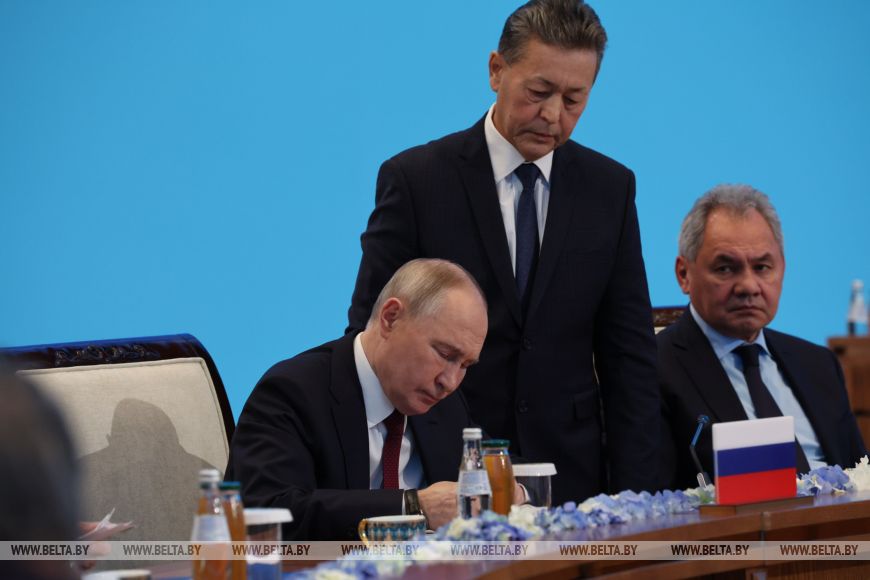
Interestingly, in previous years the media might not have reported a speech by Aleksandr Lukashenko at all unless the forum was held in Belarus. Narrow-format meetings at CSTO summits have the press only for the first couple of minutes. Everything is limited to a brief introductory speech by the host of the summit (in the latest case, the president of Kazakhstan). The plenary session is addressed, as a rule, only by the chairman and the head of state that takes over the chairmanship for the next period. Then the CSTO secretary general briefs the heads of state about the list of documents to be signed. This is it.
There is nothing surprising about this practice, because the leaders of the countries discuss security matters which are usually not made public. But in past few years summit protocol has become more liberal: the presidential press pools are allowed to film the speech of their leader. It is either televised or not. It depends on the decision of a particular head of state. Since Aleksandr Lukashenko has never shunned away from press, media interest in CSTO summits is growing not only in Belarus, but also abroad.

The CSTO is not a bureaucratized organization, in contrast to the UN Secretariat which the Belarusian head of state recently criticized at the climate summit in Baku. There are no regulations. You can deliver a speech (however long) and touch on the items you think important. In general, there is something to listen to and, most importantly, something to heed to.
About Armenia’s ‘freeze’
Unfortunately, the CSTO has not been meeting in full strength lately. The current summit was attended by five heads of state out of six member countries. Those were the presidents of Belarus, Kazakhstan, Russia, Tajikistan and Kyrgyzstan.
Astana would have been happy to see Armenian Prime Minister Nikol Pashinyan, but earlier he announced that Armenia froze its participation in the CSTO. The reason is obvious. He expected a more active involvement of the organization in the situation around the conflict with Azerbaijan.
However, there is nothing to hold against partners, especially Russia, and Belarus. They did a lot for a peaceful settlement over the years! But they placed the main emphasis on political and diplomatic means, because Azerbaijan is not an alien country for the CSTO but a partner in the Commonwealth of Independent States. Was it in the interests of the CSTO to fan the fire of the conflict that might have dragged many countries? Most importantly - to pour water on the mill of the West who acts on the premise ‘the worse things in the post-Soviet space are, the better it is for them’. A striking example is Ukraine.
As a result, history put everything in its place. Yerevan and Baku are close to concluding a peace agreement, and the leaders of these countries communicate quite normally meeting on the sidelines of various international forums. But Nikol Pashinyan would not attend CSTO summits.
Aleksandr Lukashenko first of all noted the absence of his colleague. Usually the leaders of the countries speak in alphabetical order according to the names of countries, and Nikol Pashinyan should have been first to take the floor. "Today I have the honor to speak first, since our Armenian colleague is not in attendance. This, by the way, characterizes the current geopolitical situation in the region and, to some extent, our organization," the Belarusian leader said.

However, Armenia has not yet withdrawn from the CSTO and, as they say, does not mind the organization taking necessary decisions in its absence.
“Armenia’s position does not contradict the procedure of adopting documents. It is sad that one of the CSTO members will not be at the meetings today. But I think that the general format of the event and the documents to be considered today will not be significantly affected by this,” State Secretary of the Security Council of Belarus Aleksandr Volfovich told BelTA before the summit.
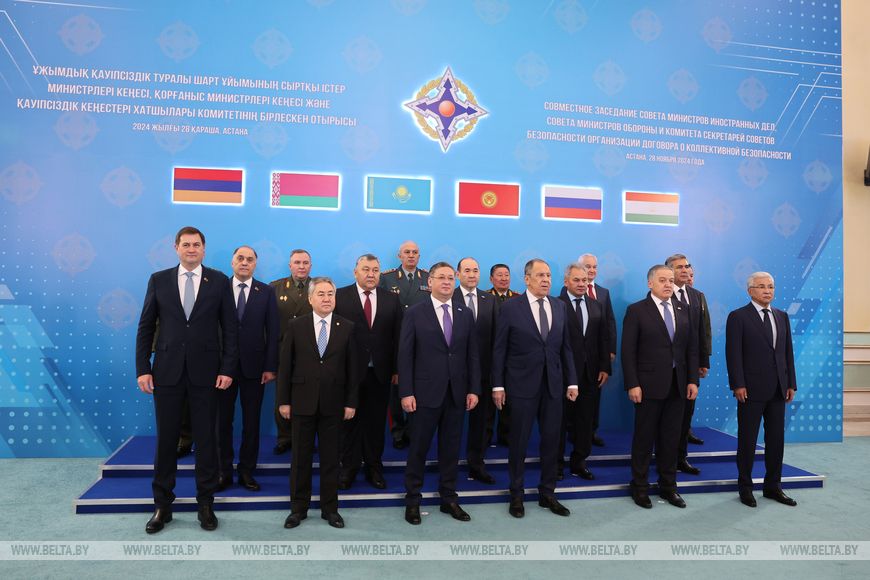
At the end of the forum, CSTO Secretary General Imangali Tasmagambetov sounded hope that Armenia would return to cooperation: “We believe that Armenia has been and remains our ally. We hope that Armenia will return to full participation in the CSTO in the foreseeable future”.
Later, Russian President Vladimir Putin also admitted that Armenia will return to full participation in the CSTO. At least, it has not yet announced its withdrawal from the CSTO and supports all the documents of the summit.
On NATOfication of Europe and the world
Mentioning Armenia, Aleksandr Lukashenko turned to global issues. “We record the worsening global situation every year. The problem is not even that the system of checks and balances, which ensured international security and strategic stability, has faded into oblivion. We have been long hesitating to develop alternative legal mechanisms,” the head of state said.
In his words, someone needs this state of affairs, when the norms and principles of international law are replaced by some subjective and situationally changing rules, instruments of military and information blackmail.
This was a case when everyone at the table clearly knew and understood who benefited from it, and Aleksandr Lukashenko even hinted at the specific beneficiaries: “Against this background, the arms race is rapidly gaining momentum. The Eastern European region, especially Poland, continues its militarization. NATofication of Europe and the world in general is underway.”

It is obvious that the West is in no hurry to get rid of militarism. “Clinging to an elusive dominance, the West is increasingly speaking the language of arms, turning a blind eye to the threats of nuclear confrontation fraught with the destruction of the entire planet,” the Belarusian president said.
On fake ‘green’ fashion and who benefits from it
Many are still under the impression of Aleksandr Lukashenko's recent brief but poignant speech at the climate summit, when he directly pointed out that the wars unleashed due to the West's fault with their harm to the environment many times outweigh the effect of the so-called green agenda.

At the end of the forum, CSTO Secretary General Imangali Tasmagambetov sounded hope that Armenia would return to cooperation: “We believe that Armenia has been and remains our ally. We hope that Armenia will return to full participation in the CSTO in the foreseeable future”.
Later, Russian President Vladimir Putin also admitted that Armenia will return to full participation in the CSTO. At least, it has not yet announced its withdrawal from the CSTO and supports all the documents of the summit.
On NATOfication of Europe and the world
Mentioning Armenia, Aleksandr Lukashenko turned to global issues. “We record the worsening global situation every year. The problem is not even that the system of checks and balances, which ensured international security and strategic stability, has faded into oblivion. We have been long hesitating to develop alternative legal mechanisms,” the head of state said.
In his words, someone needs this state of affairs, when the norms and principles of international law are replaced by some subjective and situationally changing rules, instruments of military and information blackmail.
This was a case when everyone at the table clearly knew and understood who benefited from it, and Aleksandr Lukashenko even hinted at the specific beneficiaries: “Against this background, the arms race is rapidly gaining momentum. The Eastern European region, especially Poland, continues its militarization. NATofication of Europe and the world in general is underway.”

It is obvious that the West is in no hurry to get rid of militarism. “Clinging to an elusive dominance, the West is increasingly speaking the language of arms, turning a blind eye to the threats of nuclear confrontation fraught with the destruction of the entire planet,” the Belarusian president said.
On fake ‘green’ fashion and who benefits from it
Many are still under the impression of Aleksandr Lukashenko's recent brief but poignant speech at the climate summit, when he directly pointed out that the wars unleashed due to the West's fault with their harm to the environment many times outweigh the effect of the so-called green agenda.

The head of state said exactly the same in Astana: "It is sad that the West uses all its resources to deal with fake problems that it creates itself. In the modern world there are a great number of transnational challenges and threats that can be tackled by joint efforts only.”
Aleksandr Lukashenko cited the climate agenda, which "Western politicians turned into business a long time ago," as a vivid example. “The trendy European Green Deal is nothing more than an unfair competition project that works exclusively in the interests of Western countries that are primarily responsible for air pollution. By the way, many are already saying this out loud,” the president said.
Approved in 2019 the European Green Deal is an economic development strategy that aims to achieve carbon neutrality by 2050 and break the dependence between economic growth and resource consumption. However, there is no consensus on it even within the EU, which causes heated debate. “Defended by some, criticized by others, misunderstood by many, Europe's Green Deal on climate change has generated heated debate across the EU,” Euronews wrote in its article in May this year.
On terrorism, AI and cybercrimes
Aleksandr Lukashenko pointed out other issues, including international terrorism. "Terrorist organizations use any opportunity to grab attention. Meanwhile, the Western countries refuse to cooperate in good faith with our organization in the fight against this evil," the Belarusian leader noted.
The president expressed concern about the prospects for the uncontrolled use of artificial intelligence, which is increasingly used to plan and solve military tasks. "With the ability to self-learn, this tool might destroy humanity if it gets out of control," he said.
Among the issues, the president also mentioned the topic of information security and cyber threats. "On the one hand, modern technologies create thousands of new opportunities and prospects. On the other hand, they give rise to many risks and threats: fake news, disinformation, attacks on critical infrastructure," Aleksandr Lukashenko pointed out.
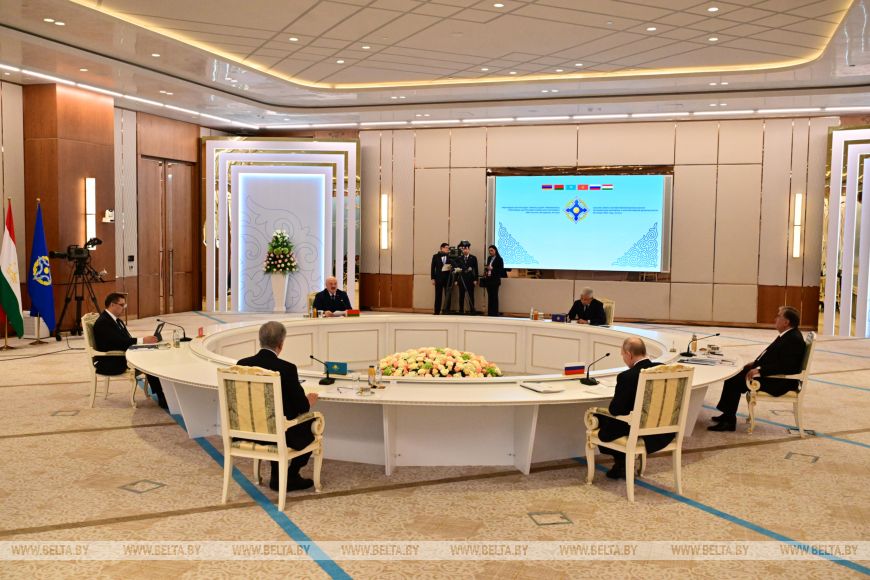
He stated that the West is not willing to discuss these and other important issues. "As we often say, any crisis creates new opportunities. It would be a sin not to use them," the head of state stressed.
On inevitable multipolarity
Aleksandr Lukashenko cited the climate agenda, which "Western politicians turned into business a long time ago," as a vivid example. “The trendy European Green Deal is nothing more than an unfair competition project that works exclusively in the interests of Western countries that are primarily responsible for air pollution. By the way, many are already saying this out loud,” the president said.
Approved in 2019 the European Green Deal is an economic development strategy that aims to achieve carbon neutrality by 2050 and break the dependence between economic growth and resource consumption. However, there is no consensus on it even within the EU, which causes heated debate. “Defended by some, criticized by others, misunderstood by many, Europe's Green Deal on climate change has generated heated debate across the EU,” Euronews wrote in its article in May this year.
On terrorism, AI and cybercrimes
Aleksandr Lukashenko pointed out other issues, including international terrorism. "Terrorist organizations use any opportunity to grab attention. Meanwhile, the Western countries refuse to cooperate in good faith with our organization in the fight against this evil," the Belarusian leader noted.
The president expressed concern about the prospects for the uncontrolled use of artificial intelligence, which is increasingly used to plan and solve military tasks. "With the ability to self-learn, this tool might destroy humanity if it gets out of control," he said.
Among the issues, the president also mentioned the topic of information security and cyber threats. "On the one hand, modern technologies create thousands of new opportunities and prospects. On the other hand, they give rise to many risks and threats: fake news, disinformation, attacks on critical infrastructure," Aleksandr Lukashenko pointed out.

He stated that the West is not willing to discuss these and other important issues. "As we often say, any crisis creates new opportunities. It would be a sin not to use them," the head of state stressed.
On inevitable multipolarity
Less than a month ago Belarus hosted the 2nd Minsk International Conference on Eurasian Security. This forum is designed to demonstrate the desire of the Eurasian states to change life for the better. “Multipolarity is a historical inevitability,” Aleksandr Lukashenko stressed.
According to the president, the idea of the Charter of Diversity and Multipolarity in the 21st century proposed by Belarus is aimed at forming a just world order based on the principles of equality, sovereignty, indivisibility, security and respect for the diversity of development paths.
On the CSTO's place in the new security architecture of Eurasia
“The key to solving problems and creating effective security mechanisms lies within our Eurasia with its thousand-year history of coexistence of different peoples, interpenetration of cultures and civilizations. In the new paradigm of international relations, the CSTO should become one of the military and political pillars of the emerging security architecture of the Eurasian continent, setting a trend for the entire regional security agenda,” the Belarusian leader said.
Aleksandr Lukashenko noted that the CSTO has amassed certain experience and needs to share it with other international organizations in the Eurasian space.
On Belarus' initiatives on new weapons control
Aleksandr Lukashenko pointed out a number of new tasks that the allies will have to address when forming a new architecture of Eurasian security and strengthening the CSTO.
First, the president considers it important to strengthen the interaction between international organizations working in Eurasia. “In this regard, I propose to think about organizing a meeting of senior officials of the regional organizations of ASEAN, the CSTO, the SCO, the CIS, the CICA, and the Gulf Cooperation Council," he said.
The president noted that there is already a proven mechanism of regular meetings of the leaders of the CSTO, the CIS and the SCO. "Why not try to expand this format in order to exchange unique interregional experience? We are ready to hold this meeting in Belarus should you agree to this proposal," Aleksandr Lukashenko said.

“Such meetings can also discuss the ways of intensifying cooperation between the CSTO and the SCO on international security issues in line with the decision of the Collective Security Council to develop cooperation between the CSTO and the CIS and the SCO. The Shanghai Cooperation Organization has a broad agenda on ensuring security in the Eurasian space, and this potential can be used," the president added.
Secondly, the president believes it necessary to tackle the issues of artificial intelligence and deepen cooperation in information security within the framework of the CSTO.
"The idea is not new. However, we have not yet begun to take practical steps within the organization. Meanwhile, Western countries are already vigorously dealing with it," Aleksandr Lukashenko said. “We also need to think about how to increase the practical impact of the 2017 CSTO agreement on cooperation in information security. We must keep pace with the rapid development of cyber technologies in order to effectively respond to the challenges and threats to the security of our countries."
Secondly, the president believes it necessary to tackle the issues of artificial intelligence and deepen cooperation in information security within the framework of the CSTO.
"The idea is not new. However, we have not yet begun to take practical steps within the organization. Meanwhile, Western countries are already vigorously dealing with it," Aleksandr Lukashenko said. “We also need to think about how to increase the practical impact of the 2017 CSTO agreement on cooperation in information security. We must keep pace with the rapid development of cyber technologies in order to effectively respond to the challenges and threats to the security of our countries."
The third task is to maintain control over new types of weapons. “We are looking at new types of deadly weapons capable of destroying all of humanity. This arsenal has already been amplified with laser, hypersonic, quantum, electromagnetic and other advanced developments,” the head of state remarked.
“In our opinion, the CSTO can and should spearhead efforts to create a common legal mechanism to keep such weapons under control in the future. This should be done now. At least, we should start,” Aleksandr Lukashenko said.
What decisions were made in Astana?
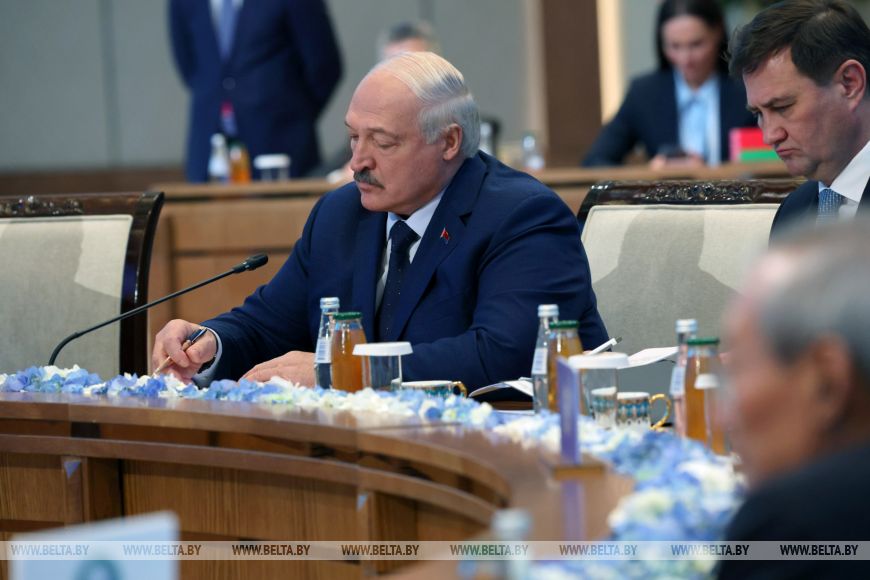
The leaders of the CSTO member states adopted a declaration and signed 14 documents. The Declaration of the CSTO Collective Security Council takes a special place in the list of documents. It reflects the dynamic development of the international military and political situation.
“The declaration outlines the organization's position on pressing international security issues, considering the fundamental principles of the organization's activities, and reflects the main approaches of the CSTO member states to international interaction and cooperation aimed at strengthening global and regional security,” the CSTO secretary general said.
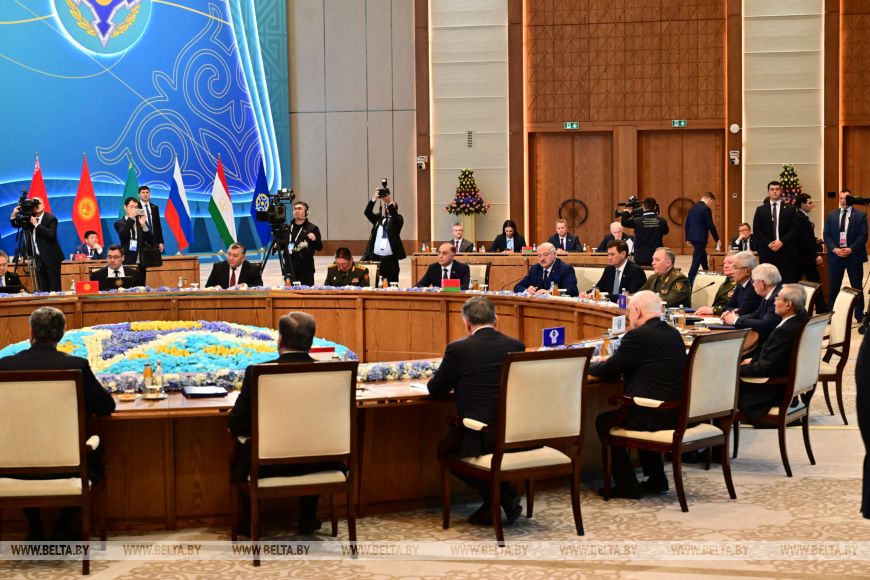
The leaders of the CSTO member states adopted a statement of the CSTO Collective Security Council on the 80th anniversary of the Victory in the Great Patriotic War.
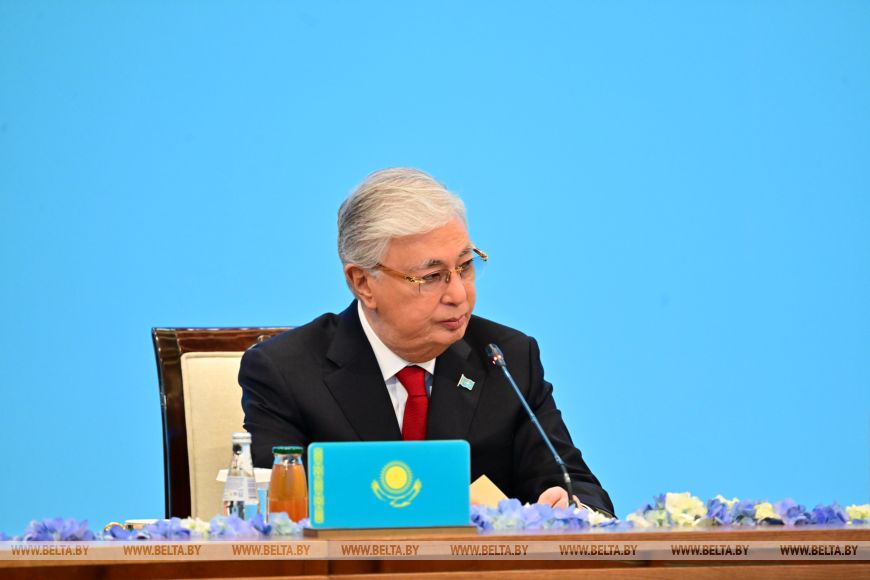
In order to further develop the collective security system, the CSTO leaders made a number of decisions aimed at further strengthening alliance, coordinating foreign policy and equipping the CSTO Collective Forces. The parties approved the CSTO Special Interstate Policy for strengthening sections of the Tajik-Afghan border which is set to be implemented in 2025-2030.

“In our opinion, the CSTO can and should spearhead efforts to create a common legal mechanism to keep such weapons under control in the future. This should be done now. At least, we should start,” Aleksandr Lukashenko said.
What decisions were made in Astana?

The leaders of the CSTO member states adopted a declaration and signed 14 documents. The Declaration of the CSTO Collective Security Council takes a special place in the list of documents. It reflects the dynamic development of the international military and political situation.
“The declaration outlines the organization's position on pressing international security issues, considering the fundamental principles of the organization's activities, and reflects the main approaches of the CSTO member states to international interaction and cooperation aimed at strengthening global and regional security,” the CSTO secretary general said.

The leaders of the CSTO member states adopted a statement of the CSTO Collective Security Council on the 80th anniversary of the Victory in the Great Patriotic War.

In order to further develop the collective security system, the CSTO leaders made a number of decisions aimed at further strengthening alliance, coordinating foreign policy and equipping the CSTO Collective Forces. The parties approved the CSTO Special Interstate Policy for strengthening sections of the Tajik-Afghan border which is set to be implemented in 2025-2030.


The participants spoke highly of the chairmanship of Kazakhstan in the CSTO. Kyrgyzstan takes over the CSTO chairmanship from Kazakhstan on 1 January 2025. In this regard, President Sadyr Japarov of Kyrgyzstan outlined the priorities for the chairmanship period.
The next meeting of the CSTO CSC will be held in Bishkek in the fourth quarter of 2025.
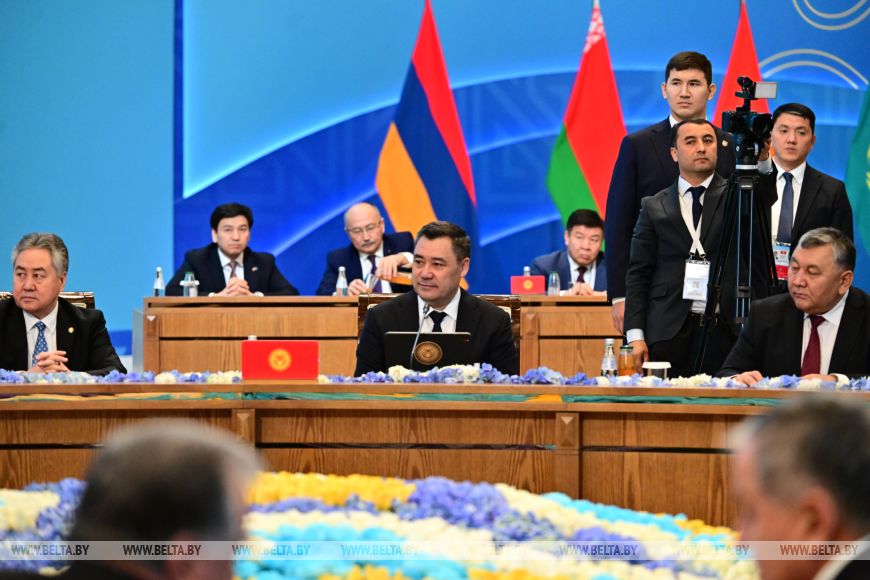
Will Belarus have the Oreshnik missile?
When the formal part of the summit was over, some journalists managed to get into the hall while the heads of state were still there. It was a good opportunity to get an exclusive interview. As for the president of Belarus, you don’t have to ask him twice – Aleksandr Lukashenko is always ready to answer any question.
So, let’s return to the above-mentioned topic of NATOfication. The head of state was asked whether the demonstration of the capabilities of the Russian missile system Oreshnik should cool down those who brought the world to the brink of WW3.

“It has already cooled them down. We have seen this right away in the media. True, there is no longer a single line, everything is in disarray. This suggests that they are a little confused,” the head of state noted. “But the weapon is good. Not nuclear but comparable in terms of power to nuclear weapons. Without penetrating radiation, without contamination of the area and facilities.”
“It did produce a strong impact on the so-called international community and especially on those who thought that everything would be fine. It won't,” the Belarusian leader stressed.
Answering a clarifying question whether it is important for the security of the Union State, the president said: “Naturally, it is. I asked jokingly the elder brother [Russian President Vladimir Putin]: ‘Places for deployment are ready. When?’ - ‘We'll think about it [Vladimir Putin replied].”
The Russian president also spoke about the new Russian weapon at the summit. He said that there are no analogues of the Oreshnik in the world, and there will not be any anytime soon. According to Vladimir Putin, Russia “was forced” to test the newest hypersonic missile system Oreshnik in a non-nuclear version in combat conditions in response to Western missile strikes on Russian territory.
At the request of the CSTO leaders, the Russian head of state unveiled details about the Oreshnik system: “Dozens of homing warheads attack a target at a speed of Mach 10 - about 3 km/sec. The temperature of the striking elements reaches 3,000°C. If my memory serves me right, the temperature on the surface of the Sun is 5,500-6,000°C. Therefore, everything that is at the epicenter of the explosion is divided into fractions, into elementary particles, essentially turning into dust. The missile can even hit highly protected objects located at great depth. According to military and technical specialists, in the case of a massive use of these missiles in a cluster, in one strike, the power of this strike will be comparable to the use of nuclear weapons. Although the Oreshnik is certainly not a weapon of mass destruction.”
The next meeting of the CSTO CSC will be held in Bishkek in the fourth quarter of 2025.

Will Belarus have the Oreshnik missile?
When the formal part of the summit was over, some journalists managed to get into the hall while the heads of state were still there. It was a good opportunity to get an exclusive interview. As for the president of Belarus, you don’t have to ask him twice – Aleksandr Lukashenko is always ready to answer any question.
So, let’s return to the above-mentioned topic of NATOfication. The head of state was asked whether the demonstration of the capabilities of the Russian missile system Oreshnik should cool down those who brought the world to the brink of WW3.

“It has already cooled them down. We have seen this right away in the media. True, there is no longer a single line, everything is in disarray. This suggests that they are a little confused,” the head of state noted. “But the weapon is good. Not nuclear but comparable in terms of power to nuclear weapons. Without penetrating radiation, without contamination of the area and facilities.”
“It did produce a strong impact on the so-called international community and especially on those who thought that everything would be fine. It won't,” the Belarusian leader stressed.
Answering a clarifying question whether it is important for the security of the Union State, the president said: “Naturally, it is. I asked jokingly the elder brother [Russian President Vladimir Putin]: ‘Places for deployment are ready. When?’ - ‘We'll think about it [Vladimir Putin replied].”
The Russian president also spoke about the new Russian weapon at the summit. He said that there are no analogues of the Oreshnik in the world, and there will not be any anytime soon. According to Vladimir Putin, Russia “was forced” to test the newest hypersonic missile system Oreshnik in a non-nuclear version in combat conditions in response to Western missile strikes on Russian territory.
At the request of the CSTO leaders, the Russian head of state unveiled details about the Oreshnik system: “Dozens of homing warheads attack a target at a speed of Mach 10 - about 3 km/sec. The temperature of the striking elements reaches 3,000°C. If my memory serves me right, the temperature on the surface of the Sun is 5,500-6,000°C. Therefore, everything that is at the epicenter of the explosion is divided into fractions, into elementary particles, essentially turning into dust. The missile can even hit highly protected objects located at great depth. According to military and technical specialists, in the case of a massive use of these missiles in a cluster, in one strike, the power of this strike will be comparable to the use of nuclear weapons. Although the Oreshnik is certainly not a weapon of mass destruction.”




